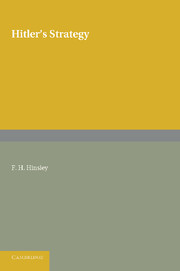Book contents
- Frontmatter
- Contents
- PREFACE
- Note on Sources and References
- CHAPTER I The German Navy, the Russian Pact, the British Problem and the Decision to Make War
- CHAPTER II The First Phase
- CHAPTER III The Invasion of Norway and the Fall of France
- CHAPTER IV An Invasion of England?
- CHAPTER V The Crucial Months, September to December 1940
- CHAPTER VI THE DECISION TO ATTACK RUSSIA
- CHAPTER VII North Africa, The Mediterranean and the Balkans in 1941
- CHAPTER VIII The Battle of the Atlantic in 1941
- CHAPTER IX German-Japanese Negotiations in 1941
- CHAPTER X 1942
- CHAPTER XI The End of the German Surface Fleet, January 1943
- CHAPTER XII Hitler's Strategy in Defeat
- APPENDIX A The German Surface Fleet
- APPENDIX B Germany's Infringements of the Naval Clauses of the Treaty of Versailles
- APPENDIX C The New U-Boats
- INDEX
CHAPTER VIII - The Battle of the Atlantic in 1941
Published online by Cambridge University Press: 05 June 2016
- Frontmatter
- Contents
- PREFACE
- Note on Sources and References
- CHAPTER I The German Navy, the Russian Pact, the British Problem and the Decision to Make War
- CHAPTER II The First Phase
- CHAPTER III The Invasion of Norway and the Fall of France
- CHAPTER IV An Invasion of England?
- CHAPTER V The Crucial Months, September to December 1940
- CHAPTER VI THE DECISION TO ATTACK RUSSIA
- CHAPTER VII North Africa, The Mediterranean and the Balkans in 1941
- CHAPTER VIII The Battle of the Atlantic in 1941
- CHAPTER IX German-Japanese Negotiations in 1941
- CHAPTER X 1942
- CHAPTER XI The End of the German Surface Fleet, January 1943
- CHAPTER XII Hitler's Strategy in Defeat
- APPENDIX A The German Surface Fleet
- APPENDIX B Germany's Infringements of the Naval Clauses of the Treaty of Versailles
- APPENDIX C The New U-Boats
- INDEX
Summary
Hitler did not hesitate to give priority to the Russian campaign over the Mediterranean throughout 1941; he insisted, in the second half of 1941, that U-boats should be transferred from the Atlantic in an effort to save North Africa. If that were the only evidence available it would still be safe to conclude that the Battle of the Atlantic suffered even more than the war in the Mediterranean from the Russian decision. But the evidence is stronger and fuller than that. The loss to the Mediterranean, by December 1941, of thirty U-boats—a half of the number that could then be kept at sea at a time, a quarter of the total operational force available— was but a fraction of the damage done to Germany's effort against the British trade routes in the previous twelve months as a result of the decision to turn on Russia.
It is true that Hitler began to show a greater understanding of, and more sympathy with, Raeder's arguments in favour of the U-boat campaign. The directive of 12 November 1940, though professing to be a comprehensive statement of German plans, had omitted all reference to the war against British trade routes; the ‘Barbarossa’ directive of 18 December 1940, on the other hand, was careful to state that ‘the main employment of the Navy remains, even during the Eastern campaign, clearly directed against England.’ And if that statement was little more than a gesture to console his naval critics, he soon showed himself anxious to make others. On 27 December 1940 he agreed that the existing building output of twelve to eighteen U-boats a month was not enough; he ‘wishes the greatest possible progress in U-boat construction’. On 8 January 1941 he ‘explains’ to Raeder—who had been explaining the same arguments for so long—that, ‘regarding our warfare against Britain, all attacks must be concentrated on supplies and on the armament industry. … The supplies and the ships bringing them must be destroyed’.
- Type
- Chapter
- Information
- Hitler's Strategy , pp. 161 - 175Publisher: Cambridge University PressPrint publication year: 2013

